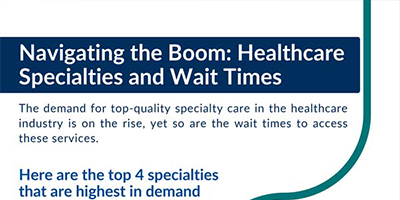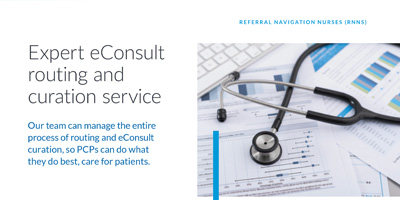Literature
Discover more about our services that support specialty care and patient access.
Thought Leadership
Literature
Videos
Care Pathways
Specialty Care Management
SpecialtyCare360 is a suite of specialty care management services to simplify the challenges you and your patients face when accessing…
A Roadmap to Practice Success and Exceptional Care
See the roadmap to practice success and exceptional care using eConsults to increase access, save money, improve quality and benefit patients.
A Clear Path Through Chronic Kidney Disease Management and Support
Chronic kidney disease management is supported by a balanced diet, exercise, blood pressure control and taking medicines as prescribed.
Navigating the Boom: Healthcare Specialties and Wait Times
The demand for top-quality specialty care in the healthcare industry is on the rise, yet so are the wait times to access these services.
An eConsult Solution to Increase Access to Care
Our eConsult solution increases specialist access with lower cost & better outcomes. PCPs receive guidance on the appropriate diagnosis and treatment plan.
Expert Referral Specialist Team Curates and Routes eConsults
Our referral specialist team of registered nurses can manage the entire process of routing and curation of electronic physician-to-specialist consults, so PCPs can do what they do best — care for patients.
Benefits of using eConsult Telehealth Services
We asked our PCPs how eConsult telehealth technology is transforming the delivery of primary care. Find out how AristaMD has impacted their practices.
Electronic Consultation Responses Across Multiple Specialty Areas
A sample electronic consultation, or eConsult, is based on an actual response from a specialist. This booklet includes…
eConsults Improve Care and Population Health at ACOs
ACOs see population health improvements with use of eConsults. Treat more patients without a referral and reduce network leakage.









